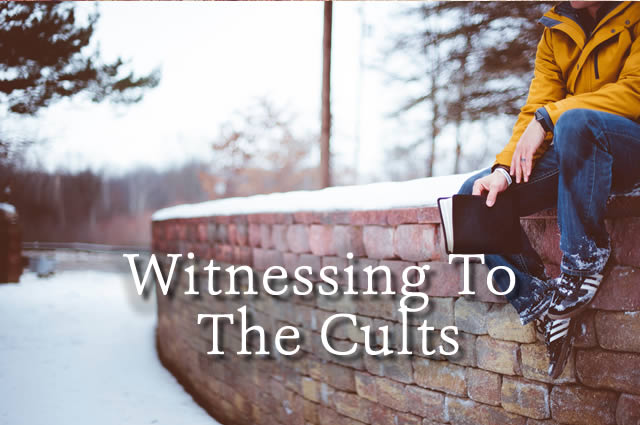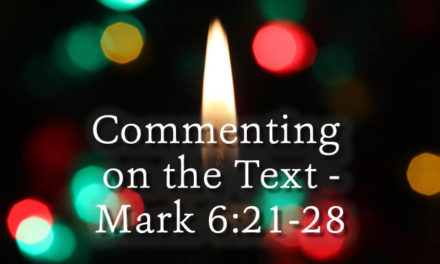“And a servant of the Lord must not quarrel! He must be kind to everyone. He must be a good teacher. He must be patient. The Lord’s servant must gently teach those who do not agree with him. Maybe God will let them change their hearts so that they can accept the truth.” 2 Timothy 2:24, 25, The Everyday Bible.
Every week hundreds of thousands of Christians encounter hundreds of thousands of Jehovah’s Witnesses, Mormons, and other cultists. The Christian witness given to these people is frequently uninformed or misinformed. Even worse it is all too often non-existent because Christians are intimidated by the cultists seeming knowledge of the Bible.
There are two basic types of witnessing encounters. The first is the cultists at your door or some other short encounter. In such circumstances all Christians should be prepared beforehand to present the gospel as outlined in 1 Corinthians 15:1-4, and to give their personal testimony. The reason we suggest this scripture is that it is the lone occurrence of the word “gospel” in association with the substance of the gospel, the death, resurrection and ascension of Jesus Christ. Cultists will invariably point to something else as their gospel and that is a difference you should point out to them.
The second type of witnessing encounter is the longer term relationship such as in a work, school, family or neighborhood environment. If you have such a long term relationship you have a greater opportunity as well as a greater responsibility to present an effective witness.
Our short term witnessing opportunity will happen unexpectedly so thought must be given beforehand. A comprehensive knowledge of the cult is not required. However, the second kind of witnessing encounter does require some depth of knowledge about the beliefs and history of the cult.
Note: You might encounter someone who is still in the recruitment stage of their involvement in the cult. You have a very good opportunity to turn them away from spiritual danger. Most recruits can be turned away before baptism. After baptism the likelihood of helping them drops precipitously.
Watchman Fellowship offers our insights based on many years of experience in study and countless encounters. If Christians would use our recommended methods there would be many thousands more “mis” believers becoming believers in Christ.
The Cultists Mindset
In order to communicate effectively with someone in a high control religion you must understand his mindset. First, he believes that his religious organization, and his alone, is God’s organization. Therefore, he has learned God’s truth and you are still in the grips of Satan’s lie. So, he reasons, how could you possibly teach him anything?
Second, his trust is actually in the leadership of the organization which is God’s prophet or “channel of communication” to his people. Though he gives lip service to complete trust in God, and sincerely believes this to be the case, his trust is actually in the cult’s human leadership. Thus he has accepted the mediation of sinful men in the place of the sinless Son of God.
Jesus said, “No man can serve two masters: for either he will hate the one, and love the other; …” or vice versa (Matthew 6:24). The cultist is actually loving the organization as his master, and “hating” the biblical truth about Christ, and he doesn’t even realize it!
In order to free him from this bondage to serve the biblical Master he must be shown that his human leaders have lied to him and can’t be trusted. This is the reason why the missionaries to the cults dwell so much on the historical record of the cults. Once the person is freed of the illusion that his leaders are of God he becomes more open to the truth about Christ.
Third, the cults condition their followers not to entertain doubts or question their leaders. To do so is to question God. This conditioning must be reversed with the information that jars them back to the real world.
Fourth, the cultist’s circle of friends is usually limited to the cult membership. You may have the singular opportunity to have input into his view of truth that is not available to him from his “friends” in the cult.
At the Door vs. Next Door
The witnessing approach used should vary with the kind of situation being faced. For instance, if you are answering the door and find two Jehovah’s Witnesses going door to door your witness should be done differently than if when you answer the door you find your Mormon neighbor wanting to borrow a tool.
In the case of the brief encounter at the door you should decide between a brief witness where you give your testimony and tell the gospel (1 Corinthians 15:1-4), or invite them back at a later date to have an extended discussion with them. If you decide to engage in an in-depth discussion you should examine the witnessing manuals Watchman Fellowship offers in our Store. Our witnessing manuals are designed to use only the materials the Jehovah’s Witness or Mormon respects, his own literature.’ Our witnessing manuals focus on such things as false prophecies, doctrinal changes over the years, and dishonesty in the handling of scripture.
In any encounter however, you can use questions to provoke them to think critically about their beliefs. See our articles Questions For Jehovah’s Witnesses and Questions For Latter-day Saints for such questions.
When the cultist is in your family you have a situation that calls for a lot of grace and love as the foundation for your witness. The above mentioned Questions articles can be used effectively. Anytime you use those questions you should ask the questions in a “help me understand” fashion. They will give you an answer and then you have the choice to pursue the issue further, or just thank them for the answer and leave it at that. The goal is to put the question in their mind. The questions I provide are designed to create a serious doubt that leads to a weakened confidence in the beliefs they have been taught by their organization. In pursuit of your goal however, you must avoid alienating them from any further questions or conversation with you. It is a difficult balance that only you can find in your relationship within your family.
Here are two suggested questions, one for the Jehovah’s Witnesses and one for the Mormons.
For Jehovah’s Witnesses ask why it is worse for Judas, because he betrayed Jesus, than if he had never been born (Mark 14:21). Since the Witnesses believe death is the cessation of existence, or annihilation, how is his post-death non-existence worse than his non-existence before he was conceived? If we gave non-existence a mathematical value it would have to be zero. So, how is Judas non-existence, zero, after his death worse, or less than, his non-existence, or zero, before his conception? Only the conscious existence of the soul after the death of the body can account for this scripture.
For the Mormons ask why the Book of Mormon does not teach Mormon doctrine even though Joseph Smith said, “…a man would get closer to God by abiding by its precepts than by any other book.” (See the Introduction in the front of the Book of Mormon). Their scripture, Doctrine and Covenants (Section 20:9), calls the Book of Mormon, “the fullness of the gospel of Jesus Christ….” Why then does it not speak of such fundamental Mormon doctrines as baptism for the dead, and celestial marriage. These are necessary in Mormon doctrine if one is to “get closer to God.”
Another element in your conversation is the appeal to their heart desire. Many people join cults with the sincere desire to find God and forgiveness for their sin. The cult experience quickly turns them toward a performance based relationship with God which rewards them only with pride in their works like the Pharisees. That performance based relationship with God also leaves them unsettled in their assurance of salvation. It is in this arena that you can tell them about your confidence in your salvation because God told you in His Word that “That if thou shalt confess with thy mouth the Lord Jesus, and shalt believe in thine heart that God hath raised him from the dead, thou shalt be saved” Romans 10:9. And, “These things have I written unto you that believe on the name of the Son of God; that ye may know that ye have eternal life, and that ye may believe on the name of the Son of God”! John 5:13.
Most people in high control religious groups will acknowledge that assurance of salvation is not something they can expect. The lack of confidence in their forgiveness from God creates a sense of anxiety or condemnation in the heart. Here Paul says, “There is therefore now no condemnation to them which are in Christ Jesus, who walk not after the flesh, but after the Spirit” Romans 8:1.
What About Debating Doctrine?
Ultimately you must prepare to answer questions about Christian doctrine from the Bible. But don’t start there because you will quickly get in to what we call “Bible Ping Pong.” You have a verse, they answer with a verse, and back and forth you go. This will usually lead to a confusing exchange of ideas and many changes of topics and will not convince the cultist.
That doctrinal discussion must come at some point but first he must be freed from his unwarranted confidence in the cult. Jesus said to the scribes and Pharisees, “Woe unto you, scribes and Pharisees, hypocrites! for ye compass sea and land to make one proselyte, and when he is made, ye make him twofold more the child of hell than yourselves” Matthew 23:15. This convert is twofold more a child of hell because he has committed to a belief system that is alien to the gospel. He must be turned away from that belief before he can return to square one, that being simply a lost sinner.
If you are addressing the beliefs of anyone in a high control religion you must be ready to accept their questions about yours. If you know the answer to their question give it to them, but if you don’t then don’t venture an answer without certainty. Tell them you will research it and get back with them later.
You might get the claim that you are “persecuting” them. Having a respectful discussion is never persecution. They may claim that many people oppose them and this constitutes persecution. Ask them if they were wrong would they want to know that? Would the person pointing out their errors be acting in love or hate?
2 Timothy 2:24 says, “And the servant of the Lord must not strive; but be gentle unto all men, apt to teach, patient,…” Our witness to them must show respect and grace. One experience we had was of a couple Jehovah’s Witness ladies who came to our home who did not know me personally, only my name. When I answered the door they introduced themselves and I told them my name was David, and my wife was Carole. Nothing more. We had about 45 minutes of enjoyable conversation about the Bible. When they got up to leave they asked my name again and I repeated “David.” One of them asked my last name and I said “Henke.” She said, “Oh my God!” And I said, “We had a very enjoyable conversation, did we not?” She admitted that we did so I suggested to her that when my name comes up at the Kingdom Hall tell them about our conversation.
But First and Finally
We are not capable of turning anyone from deception to truth. We are only God’s witnesses. He only can open the heart and mind therefore we must ask God in our prayers to open the eyes and ears as we give our witness.
By David Henke






